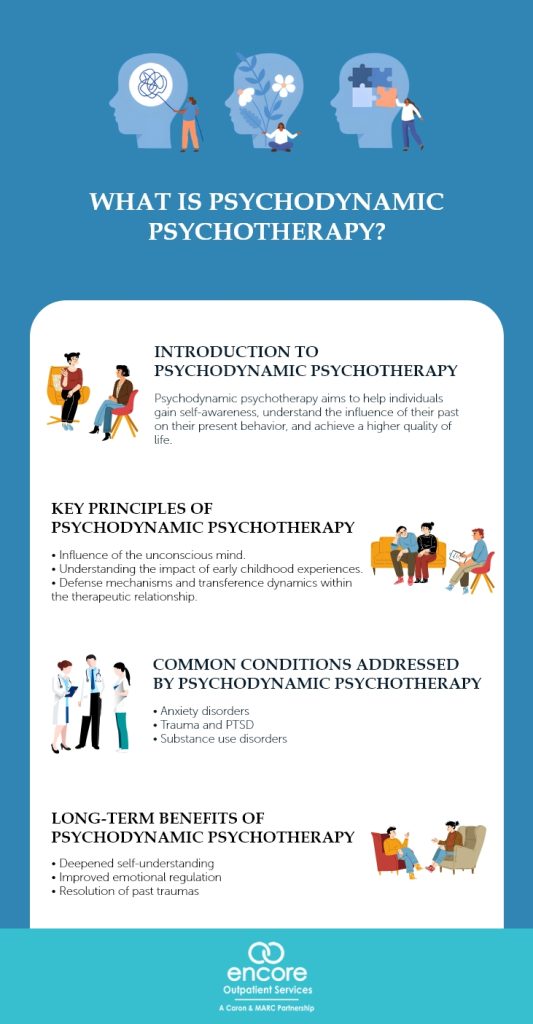Psychodynamic psychotherapy is an in-depth form of talk therapy that focuses on revealing and resolving unconscious conflicts driving a person’s mental health conditions. This therapeutic approach explores the connection between a person’s past experiences, often from childhood, and their current mindset. By exploring the fundamental principles, techniques, and applications of psychodynamic psychotherapy, we wish to provide an insightful overview for those seeking to understand this complex yet profoundly influential form of therapy.
Introduction to Psychodynamic Psychotherapy
Psychodynamic psychotherapy is a therapeutic approach deeply rooted in the theories of Sigmund Freud, the founder of psychoanalysis. Developed in the late 19th century, this approach focuses on the psychological roots of emotional suffering. Psychodynamic psychotherapy aims to help individuals gain self-awareness, understand the influence of their past on their present behavior, and achieve a higher quality of life.
The core premise of psychodynamic psychotherapy is the belief that early life experiences, particularly those in childhood, significantly influence adult personality and behavior. It posits that psychological disorders and challenges stem from unresolved issues, usually unconscious conflicts, often originating in childhood. These unresolved conflicts can be associated with events or painful feelings that were repressed because they were too difficult for the conscious mind to handle.
Unlike more directive therapies, psychodynamic psychotherapy emphasizes self-reflection and self-examination. Collaboratively, the therapist and patient investigate the patient’s inner world.
This includes their emotions, thoughts, early-life experiences, and beliefs. The therapist helps the patient understand how these unconscious elements affect current behavior and relationships.
Key Principles of Psychodynamic Psychotherapy
Psychodynamic psychotherapy is built on several key principles that guide its practice and understanding.
- Influence of the Unconscious Mind – A central principle is that many mental processes are unconscious. These unconscious thoughts and feelings significantly impact our conscious behaviors and emotions.
- Impact of Early Childhood Experiences – Early relationships, especially with primary caregivers, are believed to shape personality and emotional development. These childhood experiences form the basis for future behavior and emotional responses.
- Role of Defense Mechanisms – Defense mechanisms are unconscious psychological strategies used to manage reality and maintain self-image. Common examples include repression, denial, and projection, which protect individuals from painful feelings.
- Transference and Countertransference – Transference involves individuals projecting feelings from past relationships onto the therapist. Countertransference is the therapist’s emotional response to the patient. This provides insight into the patient’s relational patterns.
- Importance of the Therapeutic Relationship – The relationship between therapist and patient is used to explore relational dynamics, offering insights into the patient’s patterns and internal conflicts.
These principles collectively form the foundation of psychodynamic psychotherapy, guiding its practice and approach in addressing a variety of psychiatric symptoms.

Common Conditions Addressed by Psychodynamic Psychotherapy
Psychodynamic psychotherapy is utilized to address a wide range of mental health challenges:
- Anxiety Disorders – It helps explore the underlying unconscious conflicts and emotional traumas that may contribute to anxiety symptoms. Psychodynamic psychotherapy is effective in treating panic disorder, generalized anxiety disorder, and other anxiety conditions.
- Depression – This therapy is effective in understanding and addressing the deep-rooted emotional issues and negative thought patterns associated with depressive symptoms.
- Personality Disorders – Psychodynamic therapy can provide insights into the complex internal dynamics and past experiences that contribute to personality disorders.
- Trauma and Post-Traumatic Stress Disorder (PTSD) – It aids in processing and integrating traumatic memories and experiences that are often at the core of PTSD.
- Relationship and Interpersonal Challenges – The therapy is beneficial for individuals struggling with relationship problems, helping them understand their relational patterns and attachment styles.
- Low Self-Esteem – Psychodynamic therapy can address low self-esteem and self-worth challenges by exploring the roots of one’s self-perception and identity.
- Grief and Loss – It provides a space to process complex emotions and unresolved feelings related to grief and bereavement.
- Chronic Stress and Life Transitions – This therapy can assist individuals in coping with the psychological impact of chronic stress and significant life changes.
- Substance Use Disorders – The therapy aims to help individuals understand and overcome their addiction by addressing underlying emotions and unresolved conflicts that may have contributed to substance use.
- Behavioral Challenges – It helps understand the unconscious motivations behind certain behaviors, thereby aiding in behavior modification.
Psychodynamic psychotherapy is particularly suited to individuals who are interested in exploring the deeper underlying causes of their psychological challenges and who are open to a long-term commitment to therapy.
The Therapeutic Process
Psychodynamic psychotherapy involves a structured yet flexible process to address mental health symptoms. Key aspects of this process include:
- Creating a Safe and Confidential Space – The therapist ensures a secure environment where individuals feel comfortable sharing their thoughts and emotions openly.
- Engaging in Reflective Dialogue – The therapist engages the patient in a reflective conversation, helping them explore and articulate their feelings, thoughts, and experiences.
- Free Association – This technique encourages patients to verbalize thoughts and feelings as they come to mind, revealing unconscious thoughts that influence their behavior.
- Dream Analysis – Dreams are explored for their symbolic meaning and relevance to the patient’s unconscious mind.
- Exploring Past Experiences – Significant focus is given to examining past relationships and events, especially from childhood, to understand their impact on current behavior and emotional well-being.
- Goal-Oriented Approach – The therapy is directed towards specific goals, such as increasing emotional awareness, improving relationship patterns, and developing healthier coping mechanisms.
The length of psychodynamic therapy can vary widely, from short-term to long-term, depending on the individual’s needs and the complexity of the psychiatric conditions addressed. Throughout the process, the therapist works collaboratively with the patient, providing guidance and insight while fostering an environment of trust and understanding.
Comparisons With Other Forms of Therapy
Psychodynamic psychotherapy is one of several therapeutic approaches, each with its unique features and methodologies. Here’s how it compares with other common therapeutic approaches:
- Cognitive-Behavioral Therapy (CBT) – While psychodynamic therapy focuses on uncovering and understanding unconscious motivations and past experiences, CBT is more oriented toward changing current thoughts and behaviors. CBT is typically more structured and short-term compared to the often long-term nature of psychodynamic therapy.
- Humanistic Therapy – Humanistic approaches, such as client-centered therapy, emphasize the individual’s capacity for self-realization and growth. Unlike the psychodynamic approach, which delves into the unconscious mind, humanistic therapy focuses on conscious thoughts and the here-and-now experiences.
- Psychoanalytic Therapy – Both therapies focus on experiences and unconscious processes, particularly those of childhood, but the key difference between psychoanalytic therapy and psychodynamic therapy lies in their treatment approach and duration.
- Interpersonal Therapy (IPT) – IPT emphasizes improving current relationships and social functioning, while psychodynamic therapy focuses on exploring unconscious patterns and past experiences to resolve internal conflicts.
The choice of therapy often depends on the individual’s specific needs, preferences, the nature of their condition, and their goals for therapy.
Long-term Benefits of Psychodynamic Psychotherapy
Psychodynamic psychotherapy offers several long-term benefits that contribute to sustained psychological health and well-being:
- Deepened Self-Understanding – One of the most significant benefits is the development of a profound understanding of oneself. Individuals gain insight into their unconscious motivations, emotional patterns, and behavioral tendencies.
- Improved Emotional Regulation – This therapy helps individuals develop better ways to manage and regulate their emotions, leading to improved emotional stability over time.
- Enhanced Relationship Skills – By understanding their interpersonal relationship patterns and past influences, individuals can build healthier and more fulfilling relationships, both personally and professionally.
- Resolution of Past Traumas – Psychodynamic psychotherapy provides a framework for processing and resolving past traumas, which can lead to a significant reduction in the long-term impact of these experiences.
- Sustained Symptom Relief – While immediate symptom relief is common in many forms of therapy, psychodynamic psychotherapy is known for its effectiveness in providing lasting relief from symptoms like anxiety and depression.
- Increased Resilience – Individuals often emerge from therapy with increased resilience and a greater capacity to cope with life’s challenges and stresses.
- Enhanced Personal Growth – This therapy promotes ongoing personal development, encouraging a continuous journey of self-discovery and self-improvement.
The enduring nature of these benefits makes psychodynamic psychotherapy a valuable option for those seeking not just immediate relief but long-term improvement in their overall quality of life.
Encore Outpatient Services provides a comprehensive and flexible approach to addiction treatment and mental health challenges. Whether you are in the early stages of change or further along in your recovery journey, our dedicated team is equipped to support you through partial hospitalization, intensive outpatient, or general outpatient programs. Our treatment center addresses not only substance use challenges and co-occurring disorders but also caters to those dealing with trauma. By offering multiple levels of care within one facility, we ensure a seamless transition as you progress through different stages of recovery. If you or a loved one is seeking a supportive and effective treatment environment, consider Encore Outpatient Services as your partner in the journey toward recovery.
